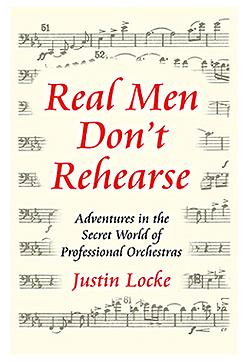Many years ago I was hired to play the bass for a performance of Handel’s Messiah. At the first rehearsal, when I opened the sheet music, I noticed something very odd: Every single quarter note in that bass part (and the Messiah is over three hours long, so we’re talking over 5000 quarter notes) had been rewritten, tediously and by hand, as a dotted 8th, and a 16th rest.
If you don’t read music, nevermind, this just means that each note had been shortened in length by 25%. This is no big deal by itself, but for someone to make this change 5000 times by hand is noteworthy, especially when all they had to do was come up to me and say, “Justin, please play all the quarter notes short, like a dotted 8th with a 16th rest.”
This seems like a small thing, but it wasn’t. For “the music” to really work, I have to let down some personal boundaries and get “in sync” with the personal energy of everyone else on the stage, including the conductor. And here, rather blatantly I might add, by his actions, this conductor had essentially said, “I’m afraid to open up my personal vulnerability and trust you. I prefer to simply issue one-directional commands.”
Now you can accept this as a legitimate management method, and many people do, but the end result was a second rate performance. I just couldn’t get in spiritual sync with this guy. It is very hard to connect with people when they just won’t let you. Orchestra protocol being what it is, I was obliged to mirror his energy back, which meant I had to close myself off emotionally as well. All I could do was mechanically execute the notes, and while no one in the audience can ever put their finger on the cause of such things, it completely lacked “the Magic.”
Conversely, the first time I worked with Henry Mancini, he intentionally skipped rehearsing “The Pink Panther.” He essentially said to us, “you guys are such great players, I completely trust you to do a great job tonight. Can’t wait to hear it.” I tell this story often because it was so extraordinary how this statement of total trust, and his making himself totally vulnerable instead of seeking command, created an absolutely astonishing level of intention and focus in each player in the orchestra. It was a simple little piece, yet it was one of the best “performances” I have ever been a part of. It had “the magic.”
I often talk about why some conductors were so much better than others, and this element of managing vulnerability and boundaries was really at the heart of it. As far as I can tell, there is no structured teaching of it. In fact, most official instruction goes in the exact opposite direction, of seeking total safety and concealment of vulnerability.

Regular readers of my blog may have noticed I have changed the title yet again. I have realized that up to now I’ve not really been managing vulnerability and boundaries very well. I have to come out of my shell and just … trust. In my young bass playing days I learned that it was “all about the fundamentals,” and these issues of vulnerability and boundaries are really at the core of so many managerial, political, and personal growth issues. This could be my next book.
(c) Justin Locke
